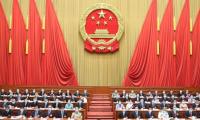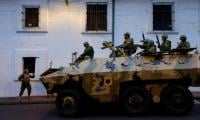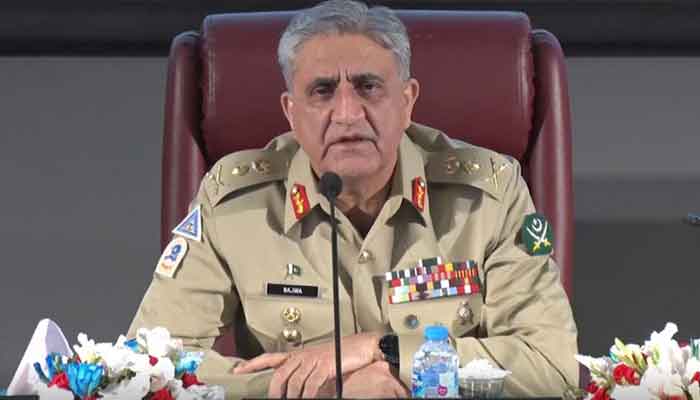Gen Bajwa says Kashmir part and parcel of our soul: World apathy on Kashmir pitiable, says PM
“They do not understand that this can go horribly wrong,” PM said during a meeting with The New York Times editors. In August, the Indian government revoked the longstanding autonomy of the IOK, arrested thousands of Kashmiris, cut off phone and internet service to millions of people and imposed a curfew.
NEW YORK/RAWALPINDI: Lamenting what he said was the world’s indifference to civilian suffering in the Indian Occupied Kashmir (IOK), Prime Minister Imran Khan on Wednesday condemned India’s military clampdown there and said he would appeal to the United Nations for help.
“They do not understand that this can go horribly wrong,” he said during a meeting with The New York Times editors. In August, the Indian government revoked the longstanding autonomy of the IOK, arrested thousands of Kashmiris, cut off phone and internet service to millions of people and imposed a curfew.
The move raised tensions between India and Pakistan, which have long been at odds over the restive region. A million troops have squared off along the disputed border, one of Asia’s tensest flashpoints and the source of two previous wars between the two countries.
Khan said he would ask the United Nations to intervene when he addressed the General Assembly on Friday. “If the UN doesn’t speak about it, who is going to speak about it?” Imran Khan said.
In revoking a 70-year-old legal provision that had given autonomy to the state of Jammu and Kashmir and buttressing its military presence there, Indian officials said the goal was to establish peace and prosperity.
Over the past two months, Indian forces have rounded up at least 2,000 Kashmiris, including elected representatives, local officials say. Imran Khan said India was behaving irrationally — and against its own longer-term interests. “Arrogance,” he said, “stops people from being rational.”
He said he would ask the United Nations to step in, warning that it was too risky to allow tensions to escalate between India and Pakistan, both of which have nuclear weapons. “This is the UN's job,” he said, adding: “They have to intervene, send observers there.” That may be a long shot.
“I can’t imagine India agreeing to it, and the UN isn’t going to intervene over India’s objections,” said Laurel Miller, director of the Asia Program at the International Crisis Group. The Kashmiris are not the only Muslim group to be oppressed as the world looks away. The Rohingya in Myanmar and the Uighurs in China have also been brutalised.
But in Kashmir, part of the problem, Ms. Miller said, may not be the message but the messenger. “There is a history, and an existing reality, of Pakistani tolerance of and support for militant groups,” she said.
Ms. Miller, like Mr. Imran, said some nations might be reluctant to press the issue because they don’t want to jeopardize their relationship with India, a major economic market. That could change, she said, if widespread violence breaks out in the IOK.
Khan said he feared that was exactly what would happen. “This is very dangerous,” he said, “because people don’t realise where it’s headed. It’s going to be a massacre, the moment they lift the curfew.”
Imran said he was not optimistic that he would accomplish anything in his speech to the United Nations, at least not in the near term. “But at least the world will be aware,” he said. “Because I fear an impending genocide.”
Separately in an interview with Wall Street Journal (WSJ), PM Khan said Pakistan wanted to lift its people out of poverty and focus on building a peaceful neighbourhood but the Rashtriya Swayamsevak Sangh (RSS)-backed Narendra Modi government was following an agenda rooted in racial supremacy. “Racism is often rooted in arrogance and arrogance can lead people to make huge blunders. That’s what Modi has done in occupied Kashmir,” he said while speaking to the editorial board of WSJ.
“I have come to New York especially for Kashmir. Everything else is secondary. The world doesn’t realise that we are heading for a big disaster,” PM Imran added. India’s repressive and illegal actions in occupied Kashmir would not only have repercussions for the region, but for the entire Muslim world, the prime minister added.
Addressing an event called 'High-Level Dialogue on Financing for Development' at the United Nations on the sidelines of the 74th session of the UN General Assembly on Thursday, Imran Khan said while it was true that illicit financial flows adversely affect wealthy countries, such movement of ill-gotten money was "devastating the developing countries" across the world.
"I do not think people fully realise the impact it (illicit financial flows) is having on poverty, deaths, destruction and human development in developing countries," said Prime Minister Imran, who was welcomed to the dialogue with a huge round of applause from the audience. He said in the last decade Pakistan had a corrupt leadership which accumulated more debt for the country in the last 10 years than in the previous 60 years.
"We are trying our best to retrieve our money," the premier said, conceding that even when his government had located properties owned by Pakistanis abroad in the past, a number of legal lacunas and loopholes had made it difficult to take such corrupt elements to task. He called upon developed countries to do better as far as the return of illicit wealth was concerned, saying "There is a lack of will in the rich countries because they gain from it."
“This not only deprives a developing country of its vital resources, but it is also not a deterrent against corruption. So, corrupt elite from poorer countries invests the looted money in advanced world without any fear of accountability.”
The prime minister questioned why offshore tax havens exist in this day and time. Prime Minister Imran Khan also met Russian Foreign Minister Sergei Lavrov on the sidelines of the 74th session of the United Nations General Assembly (UNGA).
The premier highlighted the human rights abuses in Indian Occupied Kashmir and underscored that these actions and India’s belligerent rhetoric and aggressive posture continued to pose a grave risk to regional peace and security.
The prime minister said the international community should take serious cognizance of the situation in the IOK as well as the region. According to a press release issued by the Foreign Office (FO), Prime Minister Imran emphasised the importance attached in Pakistan’s foreign policy to "a qualitatively new relationship" with Russia.
The premier noted that Pakistan and Russia had maintained a close contact following India's unilateral and illegal action to revoke the IOK’s special autonomy on August 5. He emphasised that the Kashmiri population under Indian occupation had been locked down for over 53 days and the international community must urge India to lift curfew and other restrictions and also play its role in the just resolution of the Kashmir dispute. Russia is the president of the UN Security Council for the current month.
The two sides also exchanged views on the Afghan peace process, with Prime Minister Imran reiterating that there was no military solution to the conflict in Afghanistan. He emphasised that the stalled peace process must be resumed at the earliest to advance the objectives of a peaceful and stable Afghanistan.
The prime minister recalled his interaction with Russian President Vladimir Putin on the sidelines of SCO Council of Heads of State in Bishkek on June 13 and their exchange of views on bilateral as well as regional and international issues.
Imran expressed satisfaction over the growth of bilateral cooperation in diverse areas including political, trade, energy, investment, security and defence fields. The premier again extended an invitation to President Putin to visit Pakistan.
He also underscored the importance of both sides consulting each other on all issues of common interest. Earlier in the day, Prime Minister Imran held a meeting with Human Rights Watch Executive Director Kenneth Roth on the sidelines of the UNGA.
The premier apprised him about the atrocities being committed by Indian forces in occupied Kashmir for the last 53 days, according to a tweet by the PTI. Meanwhile, Chief of the Army Staff (COAS) General Qamar Javed Bajwa on Thursday said the security situation of Pakistan was fast improving and was moving from better stability to enduring peace, which was essential for foreign investment and economic growth.
He was talking to Sheikh Ali Bin Abdulla Thani Al-Thani, Chief Executive of the International Islamic Bank and Member of the Ruling Family of the State of Qatar, who called on him here at the GHQ, a statement from the ISPR said.
An enabling environment, including security for economic cooperation, came under discussion. The visiting dignitary appreciated the role of Pakistan Army in ensuring peace and stability in the country and the region.
General Bajwa also met students and faculty of various educational institutions of Azad Jammu and Kashmir, members of Youth Parliament Pakistan from AJ&K and members of Youth State Assembly from Azad Jammu and Kashmir here at the ISPR.
Addressing the students, he once again maintained that the Kashmir dispute had to be settled as per aspirations of Kashmiris and in accordance with the relevant resolutions of the United Nations Security Council (UNSC) resolutions.
“Kashmir is part and parcel of our soul," General Bajwa said, adding that Kashmir was not an issue of geography but Pakistanis' love with the people of Kashmir. The COAS said India’s deliberate targeting of innocent civilians in Azad Jammu and Kashmir and continued siege of innocent Kashmiris in Indian Occupied Jammu and Kashmir were the worst examples of human rights violations.
"We stand with our Kashmiri brothers and sisters and shall never disappoint them," he maintained. “Continue working hard as in your success is success of Pakistan," the Army Chief said.
He urged the youth to stay steadfast, work hard and have confidence in themselves and the national leadership. The Kashmiri youth also conveyed their resolve and said Kashmiris on both sides of LOC were, are and shall stay Pakistanis for life. The COAS was also presented a Kashmiri shawl by the students.
-
 Microsoft Plans To License AI Agents Like Employees
Microsoft Plans To License AI Agents Like Employees -
 OpenAI Eyes NATO Contract For Coalition Networks Following Pentagon Deal, Source Says
OpenAI Eyes NATO Contract For Coalition Networks Following Pentagon Deal, Source Says -
 Sam Altman Responds To Criticism Over OpenAI’s Pentagon AI Contract
Sam Altman Responds To Criticism Over OpenAI’s Pentagon AI Contract -
 Arnold Schwarzenegger Receives Major Honour After Shocking Snub
Arnold Schwarzenegger Receives Major Honour After Shocking Snub -
 China’s Two Sessions 2026: Key Decisions, Economic Targets And Policy Shifts To Watch
China’s Two Sessions 2026: Key Decisions, Economic Targets And Policy Shifts To Watch -
 Flames’ New Arena In Calgary Earns Praise From NHL Commissioner After Construction Visit
Flames’ New Arena In Calgary Earns Praise From NHL Commissioner After Construction Visit -
 New Email Connects Jeffrey Epstein To Beatrice And Eugenie Because Of Sarah Ferguson: ‘They Should Own This Publicly’
New Email Connects Jeffrey Epstein To Beatrice And Eugenie Because Of Sarah Ferguson: ‘They Should Own This Publicly’ -
 Are You Quitting ChatGPT? Here’s What To Do Before You Switch
Are You Quitting ChatGPT? Here’s What To Do Before You Switch -
 Wild Acquire Michael McCarron From Predators In Trade For 2028 Second Round Pick
Wild Acquire Michael McCarron From Predators In Trade For 2028 Second Round Pick -
 Christopher Reid Gives Update On His ‘heart Failure’
Christopher Reid Gives Update On His ‘heart Failure’ -
 Cole Smith Joins Golden Knights In Deal With Nashville Predators
Cole Smith Joins Golden Knights In Deal With Nashville Predators -
 Arber Xhekaj Rumours Surface As Flames Explore Trade Options With Canadiens
Arber Xhekaj Rumours Surface As Flames Explore Trade Options With Canadiens -
 Sarah Ferguson’s Utter Devastation Comes Forward: ‘Her Safety Nets Are Gone’
Sarah Ferguson’s Utter Devastation Comes Forward: ‘Her Safety Nets Are Gone’ -
 Ecuador Drug War Intensifies As US And Local Forces Launch Operations
Ecuador Drug War Intensifies As US And Local Forces Launch Operations -
 South Korea Markets Sink As Kospi Records Worst Day In Decades Amid Iran Conflict
South Korea Markets Sink As Kospi Records Worst Day In Decades Amid Iran Conflict -
 Social Media Ban: Virginia Appeals Injunction Against Social Media Screen Time Limit For Children
Social Media Ban: Virginia Appeals Injunction Against Social Media Screen Time Limit For Children




